Tuesday Feb 03, 2026
Tuesday Feb 03, 2026
Wednesday, 3 August 2016 00:00 - - {{hitsCtrl.values.hits}}

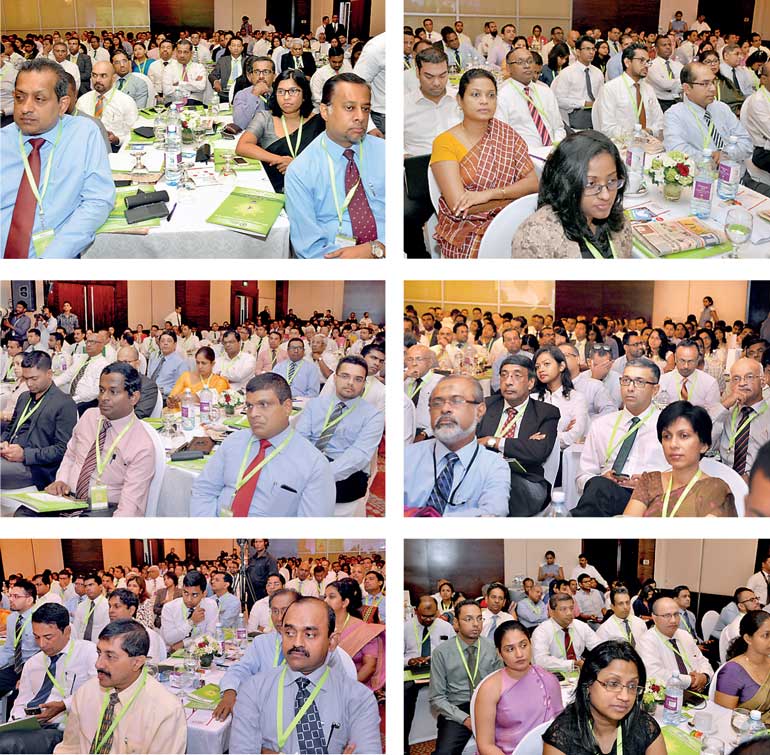
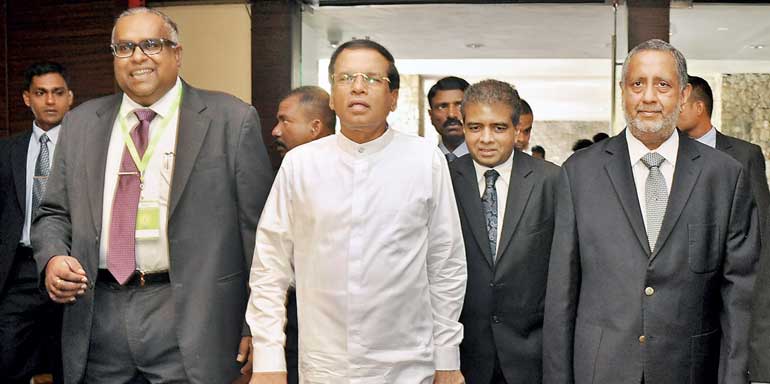 President Maithripala Sirisena being ushered by Ceylon Chamber of Commerce Chairman Samantha Ranatunga (left), Vice Chairman Rajendra Theagarajah and Deputy Vice Chairman Dr. Hans Wijayasuriya at the inauguration of the Sri Lanka Economic Summit - Pix by Upul Abayasekara and Lasantha Kumara. See more Pix on P14
President Maithripala Sirisena being ushered by Ceylon Chamber of Commerce Chairman Samantha Ranatunga (left), Vice Chairman Rajendra Theagarajah and Deputy Vice Chairman Dr. Hans Wijayasuriya at the inauguration of the Sri Lanka Economic Summit - Pix by Upul Abayasekara and Lasantha Kumara. See more Pix on P14
By Uditha Jayasinghe
Tough-talking speakers and panellists, including President Maithripala Sirisena, Finance Minister Ravi Karunanayake and Central Bank Governor Dr. Indrajit Coomaraswamy set the stage alight yesterday at the Sri Lanka Economic Summit, the flagship event of the Ceylon Chamber of Commerce (CCC), with their uncompromising evaluations of the prevailing economic situation, shortcomings 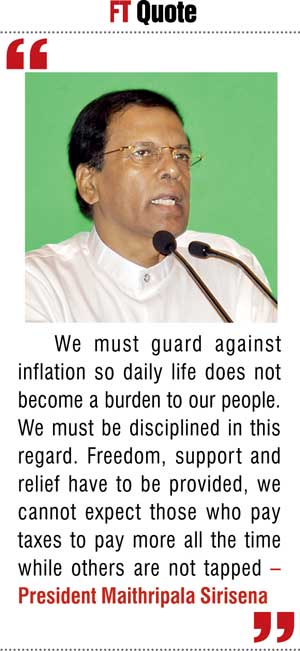 in policymaking and the incredible amount of work that remains to be done to move forward.
in policymaking and the incredible amount of work that remains to be done to move forward.
Increasing risk appetite
Finance Minister Ravi Karunanayake next took the podium to call on the private sector to engage more with the Government and “increase their risk appetite” to make use of the significant trade agreements and policy decisions made by lawmakers.
“The private sector has to spell out where the Government should be taking the country. When the Good Governance Government took over the country was in conflict to decide how to manage its fiscal policy. There have been clear violations of administration and implementation of policy. Wings of change brought a new President and Prime Minister and their respective policies had to be brought together into a national policy.”
At the time when the Government took office revenue was insufficient for Sri Lanka to pay its debts, Karunanayake recalled, as revenue was dwindling against GDP, from about 17% to 10% of GDP in 2014.
“So we had to get the economy into perspective butcertain election promises had to be kept as well so revenue had to be increased to meet expenditure. Today we are happy to state that debt did not increase in 2015 and we were able to meet payments.”
Referring to Sri Lanka as “an island of poverty in an ocean of wealth,” the Finance Minister said Sri Lanka has to seize the “golden opportunity” and take a much bigger risk to achieve economic growth.
“The private sector has to take up the opportunity that has been given. The Government is concentrating on regulation and not competing with the private sector and this where we need to move from talking to action. We believe the private sector is far too averse to risk, this is the time to come up with new ideas and proposals.” The Government has already planned for fiscal consolidation, which is challenged by debt created by the previous Government that spent excessively on infrastructure at high interest rates. At Sri Lanka’s current level of revenue it would take many more years to repay debt. Such prohibitive factors are challenges the Government is facing, therefore the fiscal space has to be improved by either higher revenue or contracting expenditure.
“We have managed to bring financial discipline to a certain extent. We are trying to ensure that an investment boom takes place but it should not come at the cost of inflation. We must steer clear of risks and take Sri Lanka to a better position. The Government is 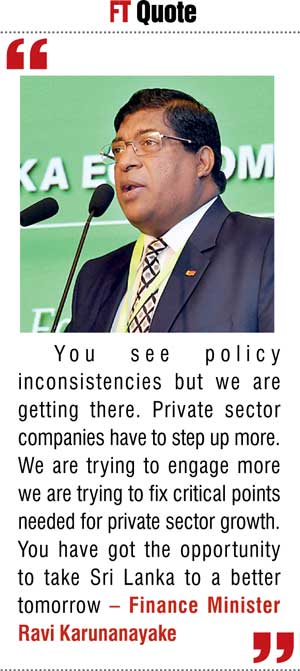 looking to put in new legislation that would reduce the time lag in policy implementation. Expenditure has been controlled that did not exist before. We are looking at cost benefit and resources at our disposal; we must ensure that taxes are used well.”
looking to put in new legislation that would reduce the time lag in policy implementation. Expenditure has been controlled that did not exist before. We are looking at cost benefit and resources at our disposal; we must ensure that taxes are used well.”
Karunanayake revealed that when the new Government revaluated costs of highways they foundeach kilometre could be reduced by 22%, which the Minister insisted shows previous mismanagement. But the new Government is attempting to enforce price controls and welcome constructive criticism.
“We welcome constructive criticism but we have to acknowledge that they have to be balanced out with political realities. We believe infrastructure today is the revenue of tomorrow, which is why we increased capital investment to Rs. 322billion in the last Budget.”
Revenue has increased by 32% in 2015, especially from Customs and in the first half there has been a 36% increase from the previous year. The Government has created foreign support and created an environment where private sector can tap businesses for investment.
“You see policy inconsistencies but we are getting there. Private sector companies have to step up more. We are trying to engage more we are trying to fix critical points needed for private sector growth. You have got the opportunity to take Sri Lanka to a better tomorrow.”
“We want to ensure the private sector is part of growth. You can meet us any time. We are navigating through some turbulent times, many countries have devalued their currency, Sri Lanka is merely a leaf caught in this storm. We are revamping key revenue collecting mechanisms and encouraging the Inland Revenue Department to be friendlier with tax payers. We have to reduce the disparity between direct and indirect taxes. We want you to talk to us and tell us what more we can do.”
Sri Lanka has two million registered enterprises out of this only 15,000 pay taxes, only 14,800 are registered to pay corporate taxes, 9.7% pay taxes and this is too little to significantly increase revenue. It is difficult to compare the revenue of Singapore and Sri Lanka because the latter has many subsidies, which at times can be unsustainable. If the private sector wants better investment climate then they must support the Government in their fiscal consolidation targets, the minister said exhorting companies to “pay a little bit more than last year”.
“We urge the captains of industry to engage with us. It is an uphill task to revamp Customs and Excise Departments. We just approved X-ray equipment for Customs and this improvement in administration is what will make the difference in Government 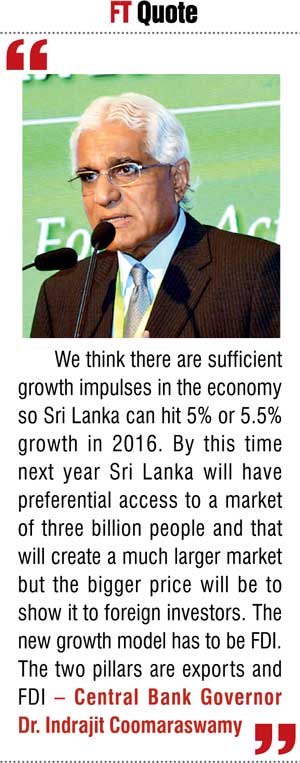 revenue. Sri Lanka has to be competitive and has to provide a larger market than just the 20million citizens. It is much more beneficial to take advantage rather than being afraid of them. There is opportunity and not just threat and local industries must take advantage and move forward.”
revenue. Sri Lanka has to be competitive and has to provide a larger market than just the 20million citizens. It is much more beneficial to take advantage rather than being afraid of them. There is opportunity and not just threat and local industries must take advantage and move forward.”
He also called on the chambers to work together and help the Government make better decisions. “Together let’s make a stronger Sri Lanka. We want you to be part of this story.”
Living standards for the common man
President Maithripala Sirisena made an impassioned plea of support for small and medium enterprises as their development would directly improve the livelihoods of middle class Sri Lankans and called on his Finance Minister to create avenues to support private sector investment including providing tax concessions where possible.
Fiscal regulation and discipline has been in short supply in Sri Lanka where loans and other funds have not been invested judiciously with significant corruption and mismanagement leading to high levels of debt, the President said.
The Government and the people now have to bear massive debt and to emerge from this morass the Government has to understand fiscal realities and these must also be considered by the private sector and the people. The public must be aware of these challenges, in many instances the public question the Government on why Sri Lanka cannot be develop as Singapore or Malaysia. But these examples may have different political systems and they may also have stronger local companies and higher exports.
“The Government needs to make a stronger contribution to guide small and medium enterprises, which at the moment make up about 8%-10% of our GDP. If the Government can support at least 20% of these enterprises then we can see stronger middle class development in Sri Lanka. Support for agriculture, healthcare and education has to be re-looked at but we cannot roll back subsidies completely. We have to strengthen national economy while maintaining our welfare systems,” said Sirisena.
Taking a pragmatic view, the President stated that top industries, especially gem businesses have the finances to invest in developing the country but they are reluctant to invest because there is little Government support and few mechanisms for them to invest in local businesses with minimum risk.
“Private sector stakeholders have also told me that the Government needs to give more tax concessions. I feel we need to pay attention to these aspects more. Not only should we understand the economic challenges but they need to assist us as well. Politicians can tell fairy tales from election podiums and go on protest marches but the results of their short-sighteddecisions are now being felt by the people.”
 “We must guard against inflation so daily life does not become a burden to our people. We must be disciplined in this regard. Freedom, support and relief have to provided, we cannot expect those who pay taxes to pay more all the time while others are not tapped.”
“We must guard against inflation so daily life does not become a burden to our people. We must be disciplined in this regard. Freedom, support and relief have to provided, we cannot expect those who pay taxes to pay more all the time while others are not tapped.”
The President called on the Finance Minister to widen the tax net and encourage more people to contribute to the national economy. “Developed countries have shown that economies are driven by the private sector and it is questionable whether Sri Lanka makes the most of the resources at our disposal.”
The maritime economy has not been tapped, the President observed whileareas such as Trincomalee has not been looked at as a resource for tourism and other industries. Sectors that are represented here have to dedicate themselves to the development of the country with the support of the Government, Sirisena advocated.
Proactive policymaking
Central Bank Governor Dr. Indrajit Coomaraswamy remains dedicated to improving Sri Lanka’s macroeconomic fundamentals, which in addition to guiding the economy and prevent its overheating, also creates the background to borrow at competitive rates from international capital markets to finance debt repayments.
Trying to create a foundation based on strong macroeconomic fundaments both the President and the Finance Minister noted that fiscal consolidation has to be a priority, which has not received sufficient attention over the last few decades. If that can be cracked, then opportunity for the private sector to invest and create jobs would be provided, the Governor said. The Government’s five-year-plan to be announced by the Prime Minister in the coming weeks would, together with the other elements of the economy, give the chance for the private sector to recalibrate their risk appetite and move forward with investment.
In the last few years Sri Lanka has grown by 4.3% from 2013-2015. In the aftermath of the war there was unsustainable growth that resulted in the Government having to put on the breaks around 2012 but the reason that the country has not returned to growth is because it failed to implement the necessary reforms to foster the right background for growth, he noted.
“At the time of independence we were only behind Japan but since then we have totally fallen behind. Sri Lanka has an excellent track record of social development, which has seen a significant reduction in poverty. Marginal increase in inflation is the main reason for the Central Bank increasing rates by 50 basis points. The Central Bank is targeting 5% of inflation but it is still double what average Asian countries have. The idea behind this is to maintain Sri Lanka’s competitiveness and the best way to ensure growth is to have a massive production drive.”
The public sector has increased exponentially over the next few years but that sector cannot grow in the next ten years because lack to fiscal space. Concerns over policy inconsistency are driven by the Government Budget, when the Government has to 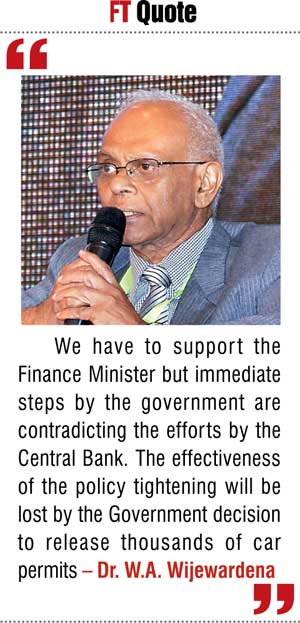 recalibrate its cash flows, taxes and other rates change and if these problems can be addressed then it staves off inconsistency.
recalibrate its cash flows, taxes and other rates change and if these problems can be addressed then it staves off inconsistency.
“There is no way to sustain 8% growth on a population of 20 million. The private sector has to make up their own minds and decide whether they can do more, those are the questions that the private sector has to address now. We need to address diversification. Tourism has been a positive spot but clearly we want more spending on a daily basis so this is a sector where we have much potential and we have to keep going. On remittances we are a little ahead and we are encouraged by that and we have seen a change in the skills of migrants but really we should be creating an environment for these people to remain in Sri Lanka.”
Investment to 35% of GDP is pointless if it is not in the right areas, the Governor said, showing data from when the infrastructure drive under the previous Government was at its highest, but the investment failed to feed growth sustainably.
“For the next five to six years the Government will have to go to the international financial markets for us to meet our debt payments. It is important we have access and what is encouraging is that the last bond was oversubscribed and while we have may not received the lowest interest rates they were lower than we expected. It is important that the Central Bank gives the signal that we have forward looking policies and build a track record of such management so we can go to markets and get money at as less a cost as possible.”
“We think there are sufficient growth impulses in the economy so Sri Lanka can hit 5% or 5.5% growth in 2016.By this time next year Sri Lanka will have preferential access to a market of 3 billion people and that will create a much larger market but the bigger price will be to show it to foreign investors.The new growth model has to be FDI. The two pillars are exports and FDI.”
“You really need to make a call. Activation of the animal spirit of the Sri Lankan private sector is crucial for the country achieves growth and hopefully take it to a different level.”
Government has to walk the talk
Eminent economist and Institute of Policy Studies Chairman Dr. Razeen Sally was eloquently honest in his assessment of the Government’s performance over the past year and a half and received loud applause from the audience for highlighting uncomfortable truths of the way the Government has handled economic policy.
In his no-holds-barred take, Dr. Sally was critical of the Government’s failure to assign the “right people to the right positions” and insisted Sri Lanka’s trade policy should be centred on a strong economic liberalisation initiative that should underpin the trade agreements to encourage foreign investment.
“Let me be candid and express some views, which may also be shared by many in the audience. There were some high expectations when this Government was appointed and my assessment is that they have not been met. Sri Lanka has had a long and sorry record with its macroeconomic policies and the excesses of the Rajapaksa years has not been corrected fundamentally so far. Two very bad budgets in the past year where there has been increase in salaries have not helped matters.The tax system is deteriorating and there has been too many adhoc changes on taxes.”
“There has been the supreme idiocy of price controls and new ones have been rolled out. The message sent out is on market busting rather than market support. Butthe window of opportunity still exists and Government priorities should be on a no harm principle so there should not be expenditure increases and adhoc tax increases.”
Dr. Sally too backed fiscal consolidationbut said at its heart is tax reform. Simplification and rationalisation of taxes and the emphasis of having clean rates with as few exemptions as possible. The Government needs to streamline approvals and there has to be liberalisation to reduce protectionism.Focus should not simply be on trade agreements but rather opening to foreign investment and then aiming for ambitious trade agreements.
“But trade agreements alone will not make a fundamental difference unless there is strong economic liberalisation, especially in sectors such as ports. The Government should aim for FTAs with European Union and US where the bulk of our exports go. The economic wish list will not happen without political adjustment and we need clean competent professionals to takeover important positions.”
Dr. Sally called for a better decision making process within Government and called for politicians to get the public behind the reform process so Sri Lanka does not lose out on a “once in a generation opportunity.” Unless the economic reforms are put in place competently the Government faces a significant backlash from the rural population who would feel left out from the economic agenda, Dr. Sally warned.
Finance Ministry has to support Central Bank
Popular Economist Dr. W.A. Wijewardenaobserved the encouraging accord between the Finance Minister and the Central Bank Governor as they are “speaking the same language”.
“The public was allowed to dance with a full punch bowl that was filled with low interest rates and printed money and last week the Governor took away the punch bowl.We have to support the Finance Minister but immediate steps by the Government are contradicting the efforts by the Central Bank. The effectiveness of the policy tightening will be lost by the Government decision to release thousands of car permits,” he said.
“What we are doing is we are negating the interest rate rise and the next thing would be they would have to go for another round of policy increases. Since they are speaking the same language today they have to have a proper policy where each institution reinforces the other. To avoid high interest rates both parties need to talk to each other and bring about policy reconciliation so they don’t work against each other.”
Research institutions have to be supplemented by a research unit from the Ceylon Chamber of Commerce so that exports can be transited to complex goods and services, he suggested.

Pix by Upul Abayasekara and Lasantha Kumara